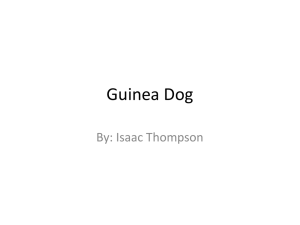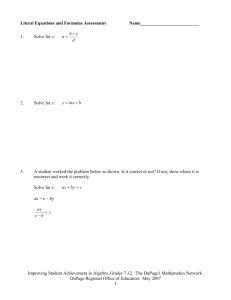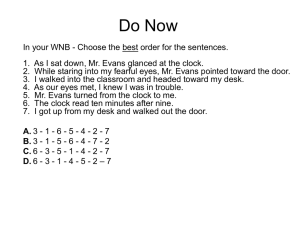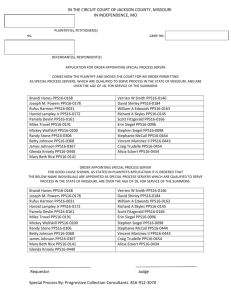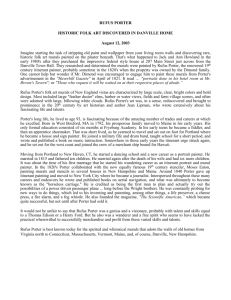durango chapters 1-7.doc
advertisement
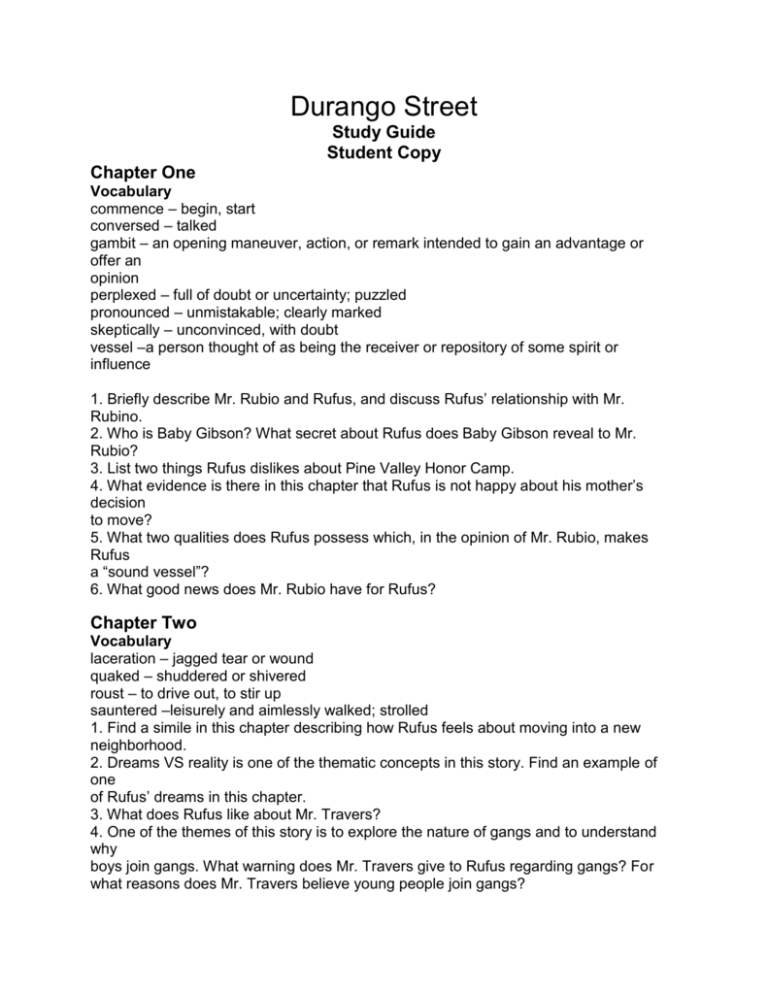
Durango Street Study Guide Student Copy Chapter One Vocabulary commence – begin, start conversed – talked gambit – an opening maneuver, action, or remark intended to gain an advantage or offer an opinion perplexed – full of doubt or uncertainty; puzzled pronounced – unmistakable; clearly marked skeptically – unconvinced, with doubt vessel –a person thought of as being the receiver or repository of some spirit or influence 1. Briefly describe Mr. Rubio and Rufus, and discuss Rufus’ relationship with Mr. Rubino. 2. Who is Baby Gibson? What secret about Rufus does Baby Gibson reveal to Mr. Rubio? 3. List two things Rufus dislikes about Pine Valley Honor Camp. 4. What evidence is there in this chapter that Rufus is not happy about his mother’s decision to move? 5. What two qualities does Rufus possess which, in the opinion of Mr. Rubio, makes Rufus a “sound vessel”? 6. What good news does Mr. Rubio have for Rufus? Chapter Two Vocabulary laceration – jagged tear or wound quaked – shuddered or shivered roust – to drive out, to stir up sauntered –leisurely and aimlessly walked; strolled 1. Find a simile in this chapter describing how Rufus feels about moving into a new neighborhood. 2. Dreams VS reality is one of the thematic concepts in this story. Find an example of one of Rufus’ dreams in this chapter. 3. What does Rufus like about Mr. Travers? 4. One of the themes of this story is to explore the nature of gangs and to understand why boys join gangs. What warning does Mr. Travers give to Rufus regarding gangs? For what reasons does Mr. Travers believe young people join gangs? 5. Why does Rufus believe many young people join gangs? 6. What evidence is there in this chapter that should Rufus decide to join a gang, Mr. Travers will be unable to stop him? Chapter Three Vocabulary antiquity – the quality of being ancient or old arbor – a place shaded by trees or shrubs festooned – adorned pensive – thinking deeply or seriously, often of sad or melancholy things scrutinized – looked at very carefully; examined closely vestibule – a small entrance hall or room either to a building or to a larger room 1. Find an example of personification in this chapter. 2. In the following passage, the author describes the area known as the “Flats.” “Mr. Travers turned into a side street in the shadow of a booming freeway that formed a solid boundary to the Flats on the east. Durango Street passed beneath the freeway and ascended a hill. But the whole Flats area was jammed between the concrete riverbed on the west and the curving gray arm of the freeway on the east.” (Pg. 20) What mood do you think the author is conveying about Durango Street and the Flats in the above passage? 3. Describe Janet, Curtis, and Mrs. Henry. How does each one feel about seeing Rufus again? How does Rufus feel about being home? 4. What kind of job does Mr. Travers find for Rufus? How does Rufus feel about the job? What plans does he have for his own future? 5. What evidence is there that Mrs. Henry is not telling Rufus the truth about her relationship with Ernie Brown? What thematic concept does her behavior illustrate? Chapter Four Vocabulary balustrade – a railing on stairs brandishing – waving, exhibiting in a menacing, challenging way ramrodding – directing, telling others what to do in an unyielding way 1. What does Rufus miss about the work camp? 2. Briefly relate the dream Rufus has about Ernie Brown. What does the dream reveal to the reader about Rufus’ life and his needs now that he is back home? 3. What advice does Rufus give to Curtis about gangs? Why is this advice ironic? How does Rufus plan to protect Curtis from the neighborhood gangs? 4. What is “gate” money? What does Rufus do with his money? Chapter Five Vocabulary scrutiny – close examination somber – earnest and solemn; grave 1. Why does Rufus refuse to go home after the gang of boys throw a bag of bottles at him? What future event does his behavior foreshadow? 2. For what reasons is Rufus angry with Janet for talking to the police? 3. What is the meaning of the following underlined slang phrases from the story? ‘Cause if you talk, it’s you the wagon’s carting off next time. (Pg. 38) A block west, the small white taco stand Rufus had seen that afternoon was getting a big play. (Pg. 38) Chapter Six Vocabulary brindled – having a gray or tawny coat streaked or spotted with a darker color meticulous – extremely or excessively careful about details 1. What does it mean to have “Gassed” hair? 2. Why does Rufus linger in Chang’s Grocery? 3. For what reasons does Rufus send Janet home alone? 4. Why does Rufus think he might have a chance against the Gassers? Chapter Seven 1. One of the themes in this novel is that Rufus sometimes has trouble distinguishing reality from his dreams. In the following passage, Rufus imagines that he sees Big Ernie in the alley. “Against the bricks stood an enormous man, black from head to foot and at least seven feet tall! It was like a miracle. Big Ernie had come up through the pavement to save him. Standing there, he seemed to say: Like the way you handle yourself in a scrap, Rufus –” (Pg. 46) In what way does this imaginary Ernie help Rufus? 2. In what ways does Rufus try to avoid problems with the Gassers? Why is he unsuccessful? 3. At the end of this chapter, Mrs. Henry tells Rufus that she was only sixteen when she was married to Ernie Brown. She also tells him to keep the information about their relationship to himself because no one would believe it. Why do you think Rufus asks her if she “got married again right away”? (Pg. 50) 4. In your opinion, is Mrs. Henry telling her son the truth about her past relationship with Ernie Brown? If not, why do you think she might make up such a story?
